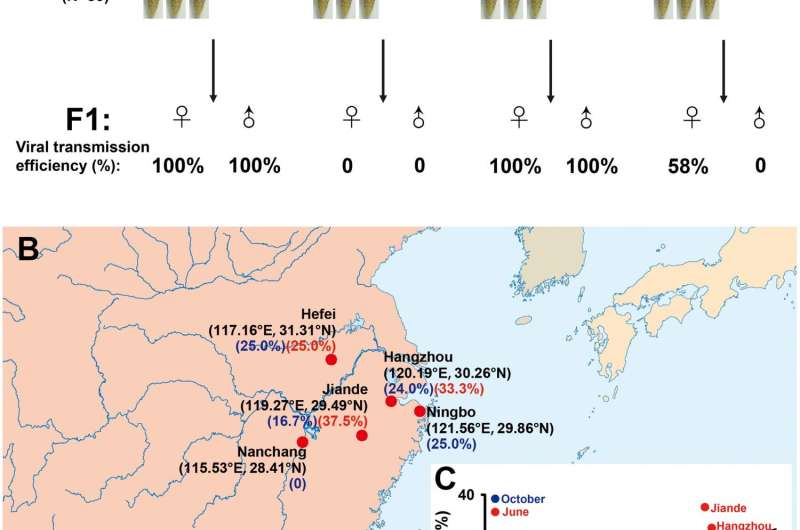Newly discovered virus affects sex ratio of insect-killing wasps

Scientists have identified a previously unknown virus that decreases the number of female offspring of the wasps it infects, according to a PLOS Pathogens study. The virus, discovered by Gongyin Ye's group of Zhejiang University, infects one species of a specific group of wasps known as parasitoid wasps.
Parasitoid wasps lay their eggs inside the bodies of the host insects. After the eggs hatch, the young wasps spend the first part of their life cycle feeding on the host insect until it dies. Many parasitoid wasps have symbiotic relationships with viruses that enable wasps to produce substances that weaken the host insect immune defense and help the wasps survive.
While studying a parasitoid wasp species known as Pteromalus puparum, Ye's team discovered signs of a virus among products of the wasp's transcriptome. They sequenced the viral genome and found that it belonged to a previously unknown species. The virus, dubbed PpNSRV-1 represents a novel genus of the taxonomic order Mononegavirales, making it the first virus of that genus to be found in parasitoid wasps.
After identifying PpNSRV-1, the researchers investigated its influence on infected wasps. They compared wasps infected by PpNSRV-1 with non-infected wasps and found that the virus lengthens the lifespan of the wasps. The scientists hypothesize that this could help the virus by giving wasps more time to transmit the virus to more hosts.
PpNSRV-1 also reduces the number of female offspring produced by the wasp. The scientists speculate that a reduced number of female offspring could also promote viral transmission. This is because both males and female wasps appear to be able to pass PpNSRV-1 to offspring, and since males can mate with multiple females, a higher ratio of males could spread the virus farther. It is first reported that the virus associated with parasitoid wasps has the key role in regulating wasp offspring sex ratio before which only bacterial symbionts such as Wolbachia are considered to be related to regulate its host wasp sex ratio.
Much more research is needed to better understand PpNSRV-1 and its full impact on wasps. For example, while the virus may extend wasp lifespan in the lab, it may not do so in nature. Better understanding of parasitoid wasps in general is useful since their insect-killing tendencies make some of them valuable for insect control in agriculture.
More information: Wang F, Fang Q, Wang B, Yan Z, Hong J, Bao Y, et al. (2017) A novel negative-stranded RNA virus mediates sex ratio in its parasitoid host. PLoS Pathog 13(3): e1006201. DOI: 10.1371/journal.ppat.1006201
Journal information: PLoS Pathogens
Provided by Public Library of Science





















